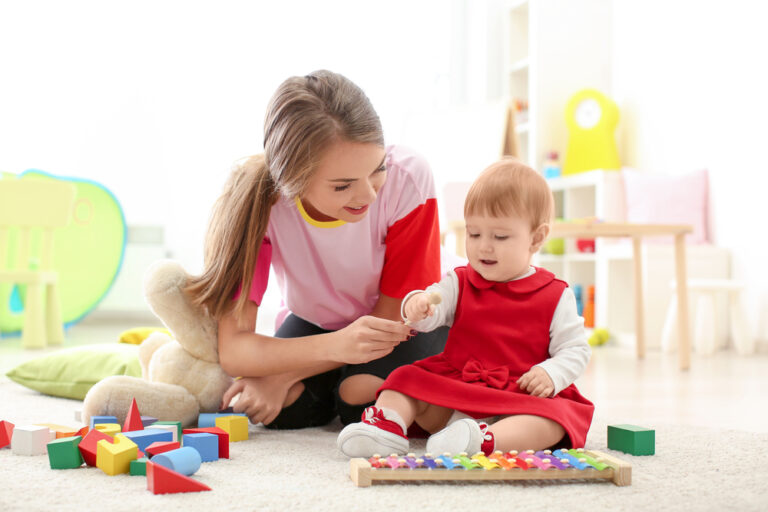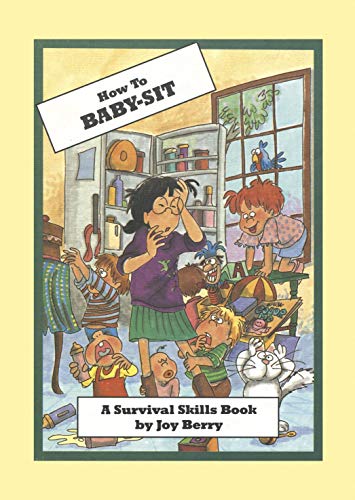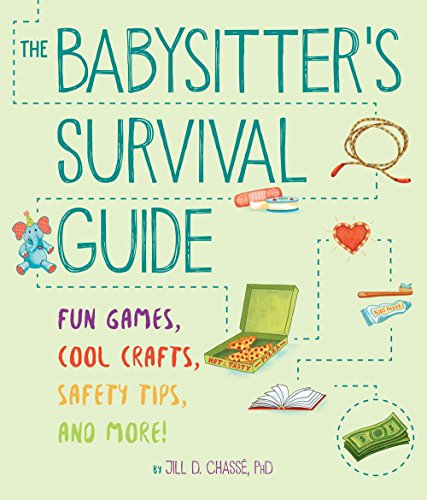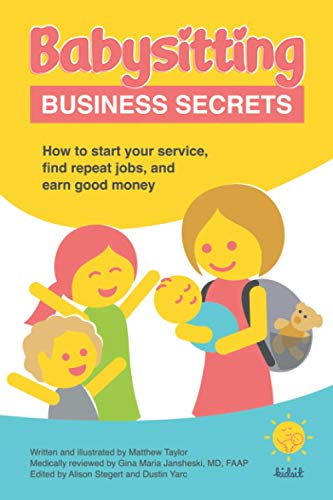You have the opportunity to babysit a baby. It’s just you, the baby, a pile of diapers… and your lack of experience.
What should you do first? What must you avoid? How will you keep this little one happy until the parent arrives home?
Stay calm and consider these top tips to make your babysitting experience go smoothly and successfully.
Before You Babysit for the First Time
Gather Information
One of the most crucial tips when doing anything for the first time is to gather up all the information you can. One way to do this is to ask the parents questions before they depart, then jot down their answers. Inquire about the baby’s typical routine during the time of day that you will be babysitting. Asking questions shows that you take this task seriously, and you want to do your best for the family. Some good questions to ask may include:
- Does the baby have any special needs or routines?
- Can I take the baby out for a walk?
- Where are the diapers, toys, clothes, etc.?
- Where do I find the bottles? If you must mix formula for a bottle, ask the parent to demonstrate how to do it.
- How much does the baby typically eat?
- Does the baby take solid foods?
- When and how often should the baby eat?
- Does the baby have a preferred burping position? (upright, on the lap, or over the shoulder?)
- How can I reach you in an emergency?
Helpful Babysitting Books
If you are needing more general information on babysitting, or if you have a teen interested in babysitting, then these books are a wonderful place to start.
The Babysitter’s Survival Guide: Fun Games, Cool Crafts, Safety Tips, and More!
Babysitting Business Secrets: How to start your service, find repeat jobs, and earn good money
The Top Two Babysitting Tips
Stay Calm
If you lack expertise in caring for little ones, you may feel slightly stressed at first. Stay calm and remember this: when parents first become parents, it’s all new to them, too.
However, there is some preparation you can do that will make this experience less scary.
If you know ahead of time that you will be babysitting an infant, spend a few hours shadowing an experienced babysitter to see how he or she does it. Better yet, spend time with a parent to learn the ins and outs of daily baby routines.
If nothing else, these options will dispel any anxieties you have about the mysteries of infant care. If you want your babysitting experience to succeed, it is crucial to ask for a list of instructions from the parents before they leave, then after they are gone and you are alone with the baby, always stay attentive, keep the instructions close at hand, and keep looking for clues as to what the baby needs.
Make Safety the Top Priority
While you are babysitting, you may get distracted by a phone call, a family pet, or a knock on the door. Although side issues may arise and grab your attention, remember to never leave the baby unattended and always follow the parent’s instructions.
Safety should be the highest priority when babysitting an infant, so keep the following tips in mind:
- Newborn babies do not have strong neck muscles and need to be supported at all times.
- Stay calm, even if a baby is fussy. Never shake a baby.
- Never leave a baby unattended on a changing table or other place where they might fall.
- Keep a baby away from choking hazards and other dangerous items.
What to Do When You Babysit a Baby
Feed the Baby
Babies are intense about their desire to eat, and this is one of the most critical parts to research before the parent walks out the door. If the infant takes solid foods, make sure you are aware of how to prepare these, too.
When the bottle is prepared, you can start feeding the baby, and it might help to keep these helpful hints in mind:
- Find a comfortable position that is safe for the baby, and hold the infant in your arms.
- Position the bottle at a horizontal angle, so that the infant can gently such the milk without ingesting too much extra air.
- Make sure the formula fills the whole nipple so that baby isn’t gulping in lots of air. This can cause gas, discomfort, and a fussy baby later.
- Take a break every few minutes to give the baby a gentle burp. Pause occasionally to gently rub the baby’s back.
- While feeding the baby, look into his or her eyes, sing a quiet song and make feeding time a pleasant time for the baby.
RELATED: How to Warm a Baby Bottle
Burp the Baby
Once you have fed the baby, you must burp him. Why is it necessary to burp a baby? One reason is that there may be trapped gas inside the intestines, and it must be expelled. Air gets into a baby’s tummy while feeding, and it needs to be released. Gas and air inside the system can mean discomfort following a feeding, and burping is the method of getting it out.
There are several ways to effectively burp a baby, and different ways work better on different babies.
Here are three basic ways to burp a baby:
- Over the shoulder burping. Position the baby’s head on your shoulder. Support the head and body while gently patting him on the back with your other hand.
- Lap burping. With the infant’s head down, lay the baby on your lap. Gently rub or pat his back until he releases a burp.
- Upright burping. Sit the baby upright on your lap, with one hand supporting him. Using your other hand, pat gently on his back.
Change the Baby’s Diapers
While babysitting, keep an eye out (and a nose) for a wet or messy diaper situation. A baby should be changed every four hours or more frequently if necessary.
Before you start, make sure everything you need for baby’s diaper change is within your reach, including diapers and wipes. Never leave the baby alone, even for a moment, since even young infants can roll over without warning.
Remove the diaper and wipe the baby’s bottom, front to back. It may help to gently lift the baby while cleaning her bottom. Remove the old diaper, place a new one underneath, and fasten it securely. Then, place the baby in a safe place, such as a crib or on a blanket on the floor while you dispose of the soiled diaper and wash your hands.
RELATED: Diaper Changing 101
Soothe the Baby
Babysitting infants can be challenging because they cannot tell you what they need. It’s common to assume that a baby is hungry if he or she is crying, but overfeeding can cause fussiness, too.
When you have a grumpy baby on your hands, you may have to try several things to soothe him or her, so consider some of these helpful hints:
- Use a pacifier. Most babies calm down when sucking.
- Wrap the baby in a large, lightweight blanket and hold him or her.
- Try a baby wrap or carrier.
- Turn on white noise, a gentle fan, or soft music. Talk quietly and calmly to the baby.
- Place the baby in an infant swing.
- Engage in peek-a-boo or other play with the baby. Some babies fuss when they are bored.
- Keep the lights low and hold the baby in your arms while gently rocking him or her.
Get the Baby to Sleep
Experts say that babies require fourteen to seventeen hours of sleep every day, which means a baby spends ¾ of the day slumbering. Despite the need for sleep, babies occasionally find it difficult to get there on their own. Other needs might get in the way of an infant’s sleep, including the need to burp or have a diaper changed.
If a baby is fussy, it’s time to troubleshoot. If he or she has been fed, burped, and changed, and has been awake for a few hours, it is likely time for a nap.
Experts recommend placing a baby on his or her back to sleep. Consult the parent instructions to find out more about this baby’s naptime routine, then let her sleep, because it’s probably what she needs.
Play With the Baby
After the baby has napped, had a diaper change, been fed, and been burped, you may be wondering what else to do with a baby while babysitting.
From birth to twelve months, babies may enjoy a variety of activities, and the most important thing to remember is that they usually enjoy play when they are doing it with an engaged and loving caregiver.
Here are some ways to interact with a baby, and some things to do with babies when babysitting:
- Sound Play. Cooing and calming talk are fun for babies. Repeat their sounds and wait for them to respond. Encourage them to mimic the sounds you make. Show babies how to push a button on a toy to make it work, or to turn the pages on a board book.
- Sing and Dance. Listen to happy music and “dance” by moving baby’s arms gently.
- Peek-A-Boo. Try hiding your face behind a blanket, a book, or your hands. Small babies like to see your face emerge, and it might make them laugh. Older babies might try to pull your hands away to find you.
- Play Ball. Roll a soft or textured ball to a baby. Offer to help them roll or throw a ball to you, then roll it back and forth.
FAQs on Babysitting a Baby
Do I need any special training to babysit?
You don’t need any particular qualifications to start babysitting, but taking a First Aid course or babysitting class can be a great help.
What should I avoid when babysitting?
Use common sense and ask good questions before the parents leave.
Make sure you understand what the baby needs, where to find the baby essentials and equipment, and what the house rules are.
Use discretion and respect the family’s privacy.
Do not take the baby out of the home without the parent’s permission, and do not record your babysitting experience on social media, or post photos of the baby.
Do not smoke, drink, or do drugs.
If I’m sick, should I still go to my babysitting job?
If you are sick, but willing to babysit, let the parent know about it so they can make the decision.
What are some benefits of babysitting?
Babysitting is a popular option for a first job because if you know a family that needs help and they trust you, it is easy to get started. It is a position that doesn’t offer high pay, but the wages are great for a first job, and it’s an ideal way to establish your reliability and gain experience.
Being a babysitter can be rewarding because you are impacting a child’s life and you can have fun doing it. It offers flexible hours and every situation is filled with unique challenges. Babysitting is rarely boring!
How much does babysitting pay?
Although the rates vary by location, the average hourly rate for a babysitter is $16.75 for one child and $19.26 for two children, according to the 2019 annual study compiled by UrbanSitter.
Conclusion
Babysitting a baby can be both challenging and rewarding.
Know the parent’s rules before you start, and keep safety in mind at all times. Don’t be reluctant to ask the parents questions before they leave, especially if it’s the first time you are babysitting for them. Doing this shows that you want to provide excellent care for their child.
Once they leave, stay calm and watch for clues to what he or she needs. Before you know it, you will be an expert and a favorite babysitter.










